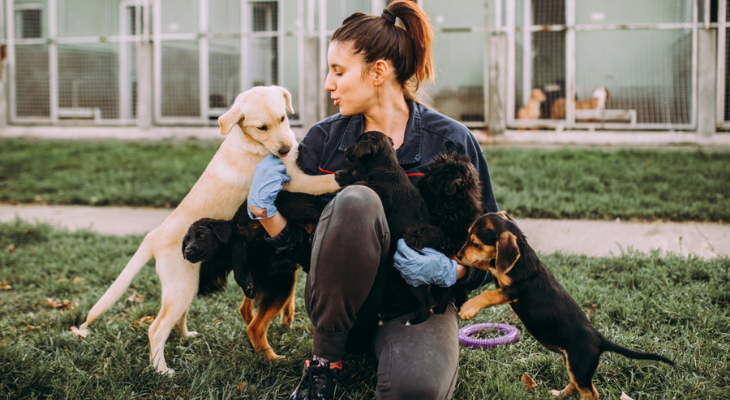
Help Your Rescue Pet Adjust to Its New Home During Adopt a Dog Month
Do you plan to add a furry friend to your family soon? Adjusting to a new home can be a little overwhelming for rescue pets, even though they're sure to enjoy all the love and affection you give them. These tips can make your new pet's first weeks at home much easier.
Stock Up on Essential Supplies
Make sure you have everything your pet will need before you bring it home from the shelter or rescue group. Must-have items include:
- A Collar. Tighter isn't better when it comes to collars. A collar fits comfortably if you can fit two fingers under it.
- Leash. Buy one or two standard 6' leashes (not retractable) for your new pet. Harnesses are a safer option for small dogs.
- Identification Tag. Even if your pet is microchipped, it's a good idea to add an ID tag to its collar.
- Dishes and Bowls. Purchase stainless steel or glass food and water bowls. (Plastic bowls can trap odors and bacteria.)
- Bed. Your new dog will need a comfy place to sleep. Choose a bed that's big enough for your pet to stretch out on.
- Toys. Every dog needs a few toys to keep it busy and engaged. The Humane Society of the United States recommends avoiding toys that are small enough to swallow.
- Crate. A crate serves as your dog's den and can help an overwhelmed dog feel a little more secure in a new home. Make sure the crate is big enough to allow your dog to turn around.
- Pooper Scooper and Bags. Feeling dog poop squish under your shoes is never a pleasant experience. Whether your pet will be relieving itself in your backyard or during walks around the neighborhood, you'll need a scooper and plenty of bags.
Wait to Change Your Dog's Food
Sudden dietary changes can cause upset stomachs and diarrhea. It's best to stick to the food the shelter or rescue group used for the first few weeks your pet is in your home. After that, add a small amount of the new food with every meal, gradually increasing the new food and decreasing the old.
Postpone Name Changes Too
How would you react if the people at a new place insisted on calling you Muffin when your name was Sterling? Trying to introduce a new name while your pet is still getting used to its new home can make the adjustment process more difficult. Chances are you'll get used to the name, even if it's not your favorite. If you still want to change the pet's name, wait a few weeks, then begin calling it Muffin Sterling, eventually dropping Sterling.
Introduce New People Slowly
It's only natural to want to introduce your new pet to your friends and neighbors. Unfortunately, meeting many new people at once can be overwhelming, particularly for a timid or fearful dog. Wait until your pet gets used to your family members before inviting other people over. Introduce one or two people at a time, if you can. Don't host any large gatherings at your home in the first few weeks after your dog comes home.
Don't Rush Pet Introductions
You never know how your new pet and your current pet will react to each other the first time they meet. It's best to keep both pets on leashes or behind gates during the first meeting.
Give Your Pet a Tour
Show your new pet the location of food and water dishes and their bed. If you want your dog to use a corner of your yard as its toilet, show your pet the preferred area. Once your dog relieves itself in the correct spot, offer a treat.
Be Patient
A few things are bound to go wrong during your pet's first days or weeks at home. Housetraining accidents, chewing, and other behavioral problems may occur as your dog learns a new routine and expectations. A patient and understanding attitude will help your pet adjust to new routines and expectations.
Take Your Pet to the Veterinarian
Your pet's vet will give your new dog a clean bill of health and offer vaccines that will prevent diseases that could sicken or kill your pet. The veterinarian will also discuss spaying or neutering your dog to prevent an unwanted litter.
Do you plan to bring a new dog home during Adopt a Dog Month in October? Contact our office to schedule your dog's first appointment with the veterinarian.
Sources:
American Kennel Club: How to Help an Adult Dog Adjust to a New Home, 6/29/21
Petfinder: Tips for the First 30 Days of Dog Adoption
Humane Society of the United States: How to Make Your New Dog Feel Comfortable in Your Home


